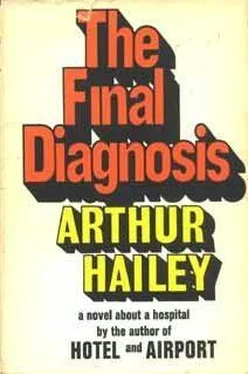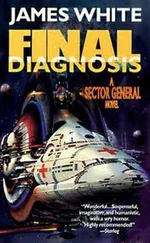Arthur Hailey - The Final Diagnosis
Здесь есть возможность читать онлайн «Arthur Hailey - The Final Diagnosis» весь текст электронной книги совершенно бесплатно (целиком полную версию без сокращений). В некоторых случаях можно слушать аудио, скачать через торрент в формате fb2 и присутствует краткое содержание. Жанр: Триллер, на английском языке. Описание произведения, (предисловие) а так же отзывы посетителей доступны на портале библиотеки ЛибКат.
- Название:The Final Diagnosis
- Автор:
- Жанр:
- Год:неизвестен
- ISBN:нет данных
- Рейтинг книги:4 / 5. Голосов: 1
-
Избранное:Добавить в избранное
- Отзывы:
-
Ваша оценка:
- 80
- 1
- 2
- 3
- 4
- 5
The Final Diagnosis: краткое содержание, описание и аннотация
Предлагаем к чтению аннотацию, описание, краткое содержание или предисловие (зависит от того, что написал сам автор книги «The Final Diagnosis»). Если вы не нашли необходимую информацию о книге — напишите в комментариях, мы постараемся отыскать её.
The Final Diagnosis — читать онлайн бесплатно полную книгу (весь текст) целиком
Ниже представлен текст книги, разбитый по страницам. Система сохранения места последней прочитанной страницы, позволяет с удобством читать онлайн бесплатно книгу «The Final Diagnosis», без необходимости каждый раз заново искать на чём Вы остановились. Поставьте закладку, и сможете в любой момент перейти на страницу, на которой закончили чтение.
Интервал:
Закладка:
Seated on the leather-covered bench outside the outpatients’ laboratory of Three Counties, Elizabeth Alexander wondered why it was that the corridor walls had been painted two shades of brown instead of something lighter and brighter. It was a dark part of the hospital anyway; a little yellow, or even a light green, would have made the place so much more cheerful.
From as far back as her memory went Elizabeth had liked bright colors. She remembered, as a little girl, the first pair of draperies she had made for her own room at home; they had been powder-blue chintz with shapes of stars and moons woven into them. She suspected now that they had been very badly made, but at the time they had seemed quite wonderful. To hang them she had gone downstairs into her father’s store and indulgently he had sought out the things she needed—a rod cut to the right length, metal brackets, screws, a screw driver. She remembered his groping to find what he wanted among the other hardware—always piled high and untidily so that more often than not he had to search for whatever a customer asked for.
That was back in New Richmond, Indiana—two years before her father had died in the accident. Or was it three? It was hard to be sure; time went by so quickly. She knew it was six months before her father’s death that she had first met John. In a way that had had to do with color too. He was on vacation from high school and had come into the store to buy some red paint. By then Elizabeth was helping in the store, and she had talked him out of it and sold him green instead. Or was it the other way around? That too was misty now.
She knew, though, she had fallen in love with John right at the first moment. Probably it was just to keep him in the store that she had suggested the switch in colors. And looking back, it seemed from then on there had never been any doubt about their feelings for each other. They had stayed sweethearts through the transition from high school to college and had been married six years after their first meeting. Strangely, though neither had any money and John was still at college on a scholarship, no one had urged them to wait. Everyone they knew seemed to accept their marriage as natural and inevitable.
To some people their first year together might have seemed difficult. To John and Elizabeth it had been a gloriously happy time. The previous year Elizabeth had gone to night secretarial’ school. And in Indianapolis, where John was at college, she had worked as a stenographer and supported them both.
That was the year they had discussed seriously the question of John’s future—whether he should aim high and try for medical school or settle for the shorter course of a medical technologist. Elizabeth had favored medical school. Though it would mean several more years before John began earning, she had been willing to continue working. But John was less sure. For as long as he could remember he had wanted to enter medicine, and his college grades were good, but he was impatient to contribute something to their marriage. Then they had discovered that Elizabeth was pregnant and, for John, it was the deciding factor. Over his wife’s protests he had enrolled in medical-technology school and they had moved to Chicago.
There they had had their baby and had called her Pamela. Four weeks later the child had died of bronchitis, and for a while all of Elizabeth’s world seemed to have fallen in about her. For all her stability and common sense, she had gone to pieces and had ceased to care. John had done all he could, had never been kinder or more considerate, but it had not helped.
She had felt she had to get away and had gone home to her mother in New Richmond. But after a week she had longed for John and had gone back to Chicago. From that point on her return to normalcy had been gradual but sure. Six weeks before John’s graduation she had learned she was pregnant again; it was the final thing she had needed for readjustment. Now she felt healthy, her old cheerfulness back, and there was a growing excitement at the thought of the unborn child within her.
In Burlington they had found a small but pleasant apartment. The rent was economical. Out of their careful savings they had made a down payment on furniture and could meet the monthly installments out of John’s hospital pay. As of this moment everything was fine. Except, Elizabeth thought, that horrible brown on the corridor walls.
The door of the outpatients’ lab opened and a woman who had been waiting ahead of Elizabeth came out. A white-coated girl technician was behind her. The technician consulted a clip board. “Mrs. Alexander?”
“That’s right.” Elizabeth stood up.
“Will you come in, please?”
She followed the girl through the doorway.
“Sit down, Mrs. Alexander. This won’t take long.”
“Thank you.”
At her desk the technician consulted the requisition slip which Dr. Dornberger had written. “Rh typing and sensitivity. All right, just put your hand here, please, and clench your fist.” She took Elizabeth’s wrist and sponged it with antiseptic, then deftly slipped on a rubber tourniquet. From a tray she selected a hypodermic and broke open a package with a sterile needle which she fitted to the syringe. Quickly selecting a vein on Elizabeth’s arm, the girl inserted the needle with a single sharp movement and eased back the plunger. She drew blood until it was level with the 7 cc. mark on the syringe, then whipped the needle out, putting a tuft of cotton batting on the puncture it had made. The whole procedure had taken less than fifteen seconds.
“I think you’ve done that before,” Elizabeth said.
The girl smiled. “A few hundred times.”
Elizabeth watched while the technician labeled a test tube and transferred the blood sample to it. When she had finished she put the test tube in a rack. Then she announced, “That’s all, Mrs. Alexander.”
Elizabeth pointed to the tube. “What happens to it now?”
“It goes to the serology lab. One of the technicians there will do the test.”
Elizabeth speculated on whether it might be John.
Mike Seddons, sitting alone in the house-staff lounge, was deeply troubled. If someone had told him a month ago that he could be this concerned about a girl that to all intents and purposes he scarcely knew, he would have adjudged the other person crazy. Yet for forty-eight hours, ever since he had read the chart in the nursing station near Vivian’s hospital room, his worry and distress had steadily grown. Last night he had scarcely slept; for hours he had lain awake, his mind turning over the full significance of the words written on the chart in Dr. Lucy Grainger’s handwriting, “Vivian Loburton—suspected osteogenic sarcoma—prepare for biopsy.”
On the first occasion he had seen Vivian—the day of the autopsy—she was merely another pretty student nurse. Even at their second meeting—before the incident in the park—he had thought of her principally as an interesting, exciting lay. Mike Seddons never fooled himself either about words or his own intentions.
Nor did he now.
For the first time in his life he was deeply and genuinely in love. And tortured with a haunting, dreadful fear.
The night he had told Vivian that he wanted to marry her he had had no time to think the implications through. Up to that point Mike Seddons had always told himself there would be no question of marriage until he was established in practice, his wild oats sown, his future financially secure. But once the words to Vivian were out he had known them to be true. A hundred times since he had repeated them silently, without a single thought of wanting to turn back.
Then this.
Unlike Vivian, who still thought of her problem as a small bump below the knee—a nuisance, but something which treatment of one kind or another would clear up—Mike Seddons knew the implications of the phrase “suspected osteogenic sarcoma.” He knew that if the diagnosis were confirmed it would mean that Vivian had a virulent, malignant tumor which could spread, and perhaps already had, elsewhere in her body. In that event, without swift surgery, her chances of survival beyond a year or so were almost nil. And surgery meant amputation of the limb—with all speed once the diagnosis was confirmed—in the hope of containing the spreading, poisonous cells before they moved too far beyond the original site. And even then, statistically, only 20 per cent of osteogenic patients were free from further trouble after amputation. The rest went steadily downhill, sometimes living only a few more months.
Читать дальшеИнтервал:
Закладка:
Похожие книги на «The Final Diagnosis»
Представляем Вашему вниманию похожие книги на «The Final Diagnosis» списком для выбора. Мы отобрали схожую по названию и смыслу литературу в надежде предоставить читателям больше вариантов отыскать новые, интересные, ещё непрочитанные произведения.
Обсуждение, отзывы о книге «The Final Diagnosis» и просто собственные мнения читателей. Оставьте ваши комментарии, напишите, что Вы думаете о произведении, его смысле или главных героях. Укажите что конкретно понравилось, а что нет, и почему Вы так считаете.












